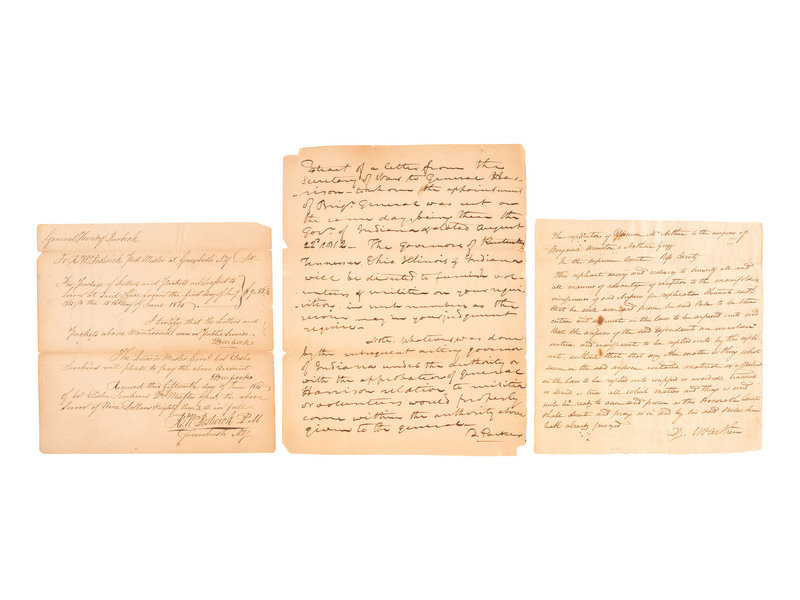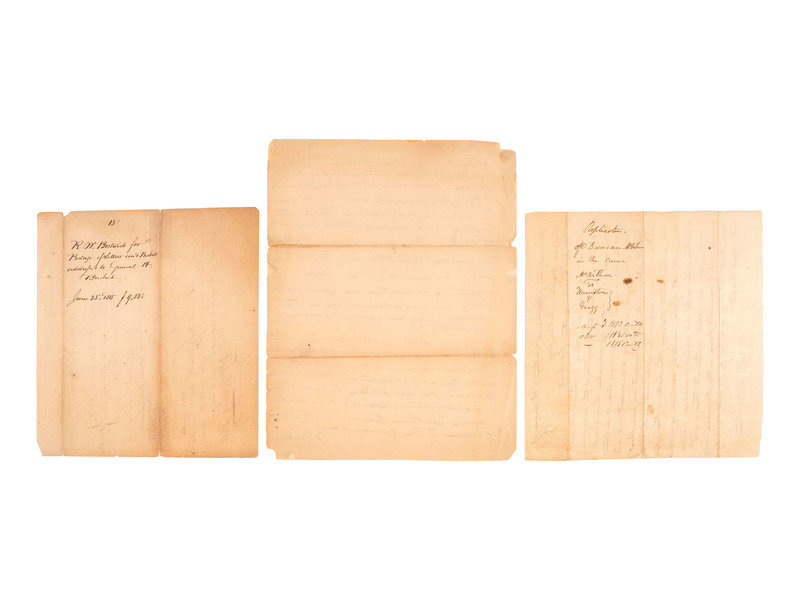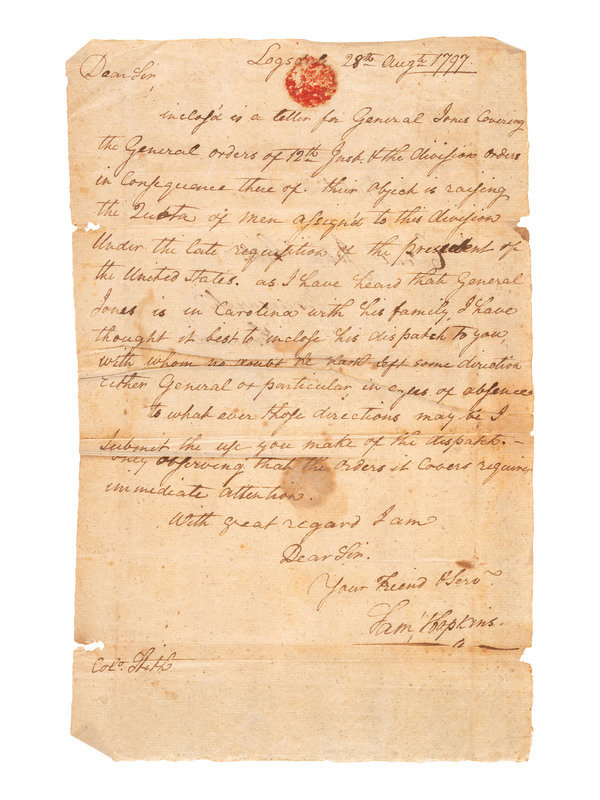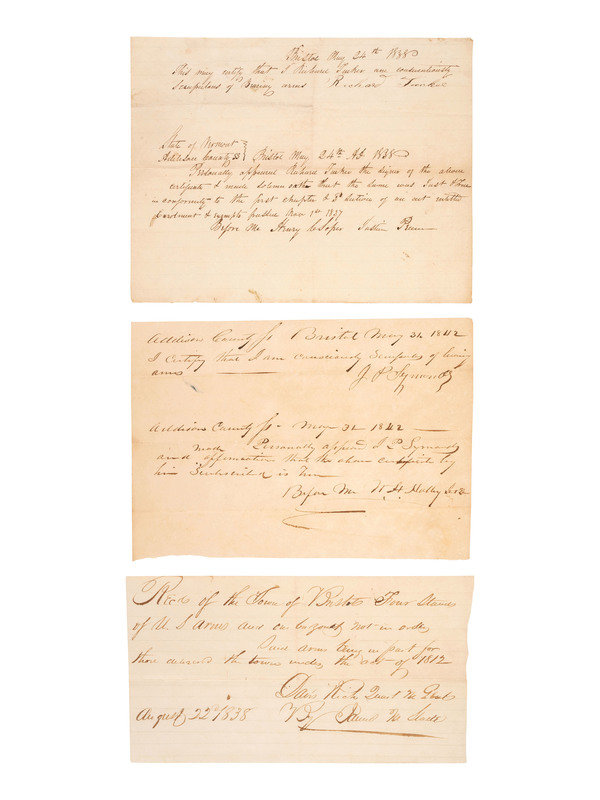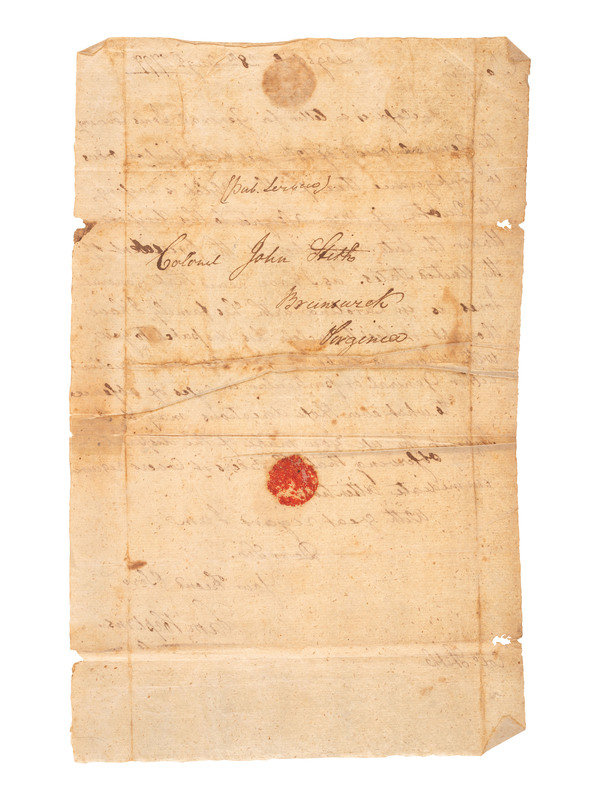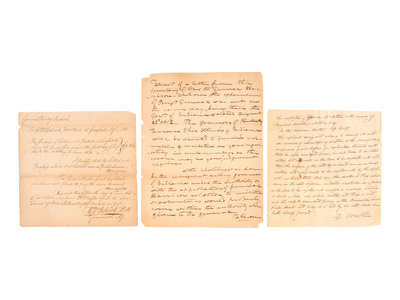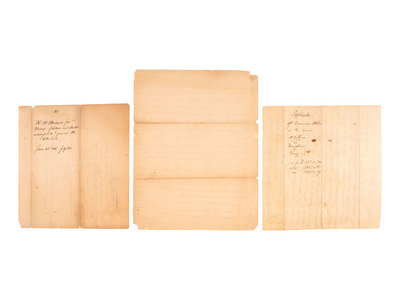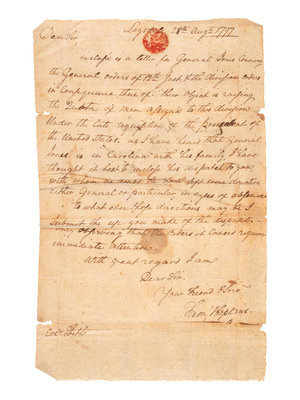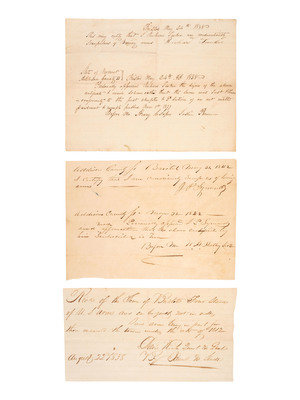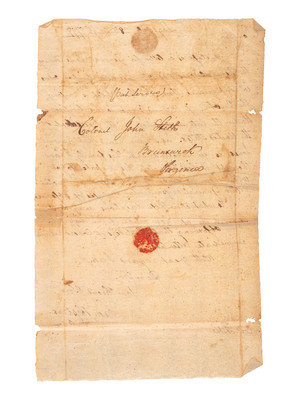Condition Report
Contact Information
Lot 54
[WAR OF 1812]. A group of signatures from War of 1812 military officers, including a scarce Henry Burbeck signed document.
Sale 1069 - American Historical Ephemera & Photography
Lots Open
Aug 19, 2022
Lots Close
Aug 30, 2022
Timed Online / Cincinnati
Own a similar item?
Estimate
$200 -
400
Price Realized
$219
Sold prices are inclusive of Buyer’s Premium
Lot Description
[WAR OF 1812]. A group of signatures from War of 1812 military officers, including a scarce Henry Burbeck signed document.
BURBECK, Henry (1754-1848). Manuscript document twice signed ("H. Burbeck"). Greenbush, NY. 15 June 1815. 1p., 8 x 7 1/2 in. (folds, some chipping, partial separation near folds, chipping to edges and corners). The document discusses remission of payment of $9.83 from Quartermaster Gen. Elisha Jenkins to Postmaster and notes, in part, "For postage of Letters and packets addressed to him at said office from the first day of January 1815 to the 15th day of June 1815. ($9.83 1/2).
Burbeck, a long-time artillery officer in the US Army, served in the Revolutionary War and the War of 1812. Prior to his military service, Burbeck worked at the copper-smith's forge with Paul Revere. During the Revolutionary War, Henry Burbeck served as an artillery officer in Henry Knox's Continental Artillery Regiment, participating in the battles of Bunker Hill, Brandywine, Monmouth, and others. He wintered with General Washington at Valley Forge. At the beginning of the War of 1812, Burbeck was summoned to New London, Connecticut, to relieve Jirah Isham of the command of the state militia. While stationed in New London, he received orders to march to Boston to take command there during the blockade by a British squadron commanded by Commodore Sir Thomas Hardy. The winter march resulted in the suffering of many of the men under his command who were frostbitten from exposure to the winter elements. After returning to New London, in July 1813, he received a letter from Gen. Armstrong which enclosed a copy of a letter written by the Governor of Virginia stating that information from British deserters indicated that British transports, under Admiral George Cockburn, sailed from Chesapeake Bay to New London, Connecticut. Burbeck responded by organizing the state militia to respond while Hardy's fleet lay off New London harbor, and he continued to command New London through the end of the war.
[With:] McARTHUR, Duncan (1772-1839). Manuscript legal document written and signed ("D. McArthur"). Undated, but notations on the back indicate the court case this document pertains to was continued in August 1812 and November 1813, and again in 1815. 1p., 7 1/2 x 7 1/2 in. (possibly trimmed along top and bottom edges, folds, few smudges). Apparently, this case was a disagreement between McArthur, Benjamin Winston, and Nathan Gregg. The substance of the issue is not clear from this document, but it appears to be McArthur's answer to his opponents prior to the court case.
McArthur was a military officer and a Federalist and National Republican politician from Ohio. He served as the 11th Governor of Ohio. When first elected to state office as a representative, he was serving in the state militia during the War of 1812. He was later appointed as Brigadier General in the US Army and commanded a brigade under General William Henry Harrison during the battle of the Thames. Shortly thereafter he was placed in charge of the Army of the Northwest, serving through 1817 and negotiating the Treaty of Fort Meigs of 1817 to ratify peace and land cessions with Native American tribes.
[With:] PARKER, Daniel (1782-1846). Memorandum written and signed ("D. Parker"). 22 August 1812. 1p., 8 x 10 in. (folds, some corner/edge wear, including some chipping). The memorandum reads, in part: "Extract of a letter from the Secretary of War to General Harrison . . . to whom the appointment of Brig, General was sent out the same day, being when the Gov. of Indiana and dated August 22, 1812 - The Governors of Kentucky, Tennessee, Ohio, Illinois and Indiana will be directed to furnish volunteers of militia on your requisition, in such numbers as the monies may in your judgement require. Note. Whatever was done by the subsequent acting Governor of Indiana under the authority of or with the approbations of General Harrison relative to militia or volunteers would properly come within the authority above given to the General." Parker (1782-1846) served as Adjutant General of the US Army, as Inspector General of the US Army, and as the Paymaster General of the US Army. His complete papers are housed at the Historical Society of Pennsylvania.
[With:] HOPKINS, Samuel (1753-1819). Autograph letter signed ("Sam Hopkins"). Logsdale, [VA]. 28 August 1797. 1p., 7 1/2 x 12 1/4 in. (folds, scattered spotting/soiling, few holes, chipping to edges). Stampless folded letter addressed to Colonel John Stith. Hopkins is referencing a letter he sent to General Jones questioning the President's orders with amount of troops supposed to be stationed there.
Hopkins was a US Representative from Kentucky. He served in the Revolutionary War, for a while on the staff of General Washington, and later as lieutenant colonel and colonel of the 10th Virginia Regiment. He was an original member of the Virginia Society of the Cincinnati. In 1796, Hopkins moved to Kentucky and settled on the Ohio River in 1797 at a point then called Red Banks, now called Henderson, Kentucky. He studied law and was admitted to the bar. Hopkins was appointed chief justice of the first court of criminal common law and chancery jurisdiction in 1799, and served until his resignation in 1801. Hopkins served as a member of the State house of representatives in 1800, 1801, and 1803–1806. He later served in the Kentucky State Senate from 1809 to 1813. In 1812, Hopkins was appointed Commander in Chief of the western frontier (Illinois and Indiana Territory), with the rank of Major General. He participated in the Peoria War and was commander at Spur's Defeat. Hopkins was elected as a Democratic-Republican to the Thirteenth Congress. Hopkins retired to his country estate, Spring Garden, near Henderson, Kentucky, and died there in September 1819. Hopkinsville, Kentucky was named for him by the Kentucky Assembly in 1804, as was Hopkins County, Kentucky two years later.
[Also with:] 3 manuscript documents, 8 x 6 1/4 in. or smaller, including: 1838 receipt, QM General, "Four Stands of US Arms and one bayonet not in order - Said arms being in part for those delivered the town under the act of 1812." -- 1838 signed oath of Richard Tucker who certifies that he is "consciously scrupulous of bearing arms." -- 1842 oath of J.P. Lymand, similar to above.
Property of a Midwest Collector
